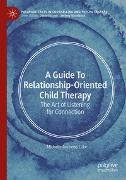Read more
This book introduces a new relationship-oriented approach to child therapy grounded in the idea that positive relationships are essential for children’s mental health and wellbeing. The author emphasises the importance of cultivating the child-therapist bond and working closely with families and teachers to nurture the wellbeing of children. By establishing and maintaining strong connections with children, and by actively including families and teachers in the therapeutic process, child therapists can truly support children to heal and grow.
Presented as a series of fifty suggestions for child therapists, this book is written straightforward, direct style and includes real case studies and practical examples that demonstrate how to listen well to children and deepen the therapeutic connection. It also highlights the many benefits of a relationship-oriented approach, including helping children to open up and share their stories, and enabling greater collaboration among therapists, families, and teachers.
Dr Michelle Andrews Luke is an educational and developmental psychologist with more than twenty years of experience listening to children and helping them to have strong and supportive relationships. She teaches graduate courses in counselling skills and working with groups at the University of Melbourne. Michelle lives with her husband and their three children in the Dandenong Ranges, Victoria, Australia.
List of contents
Chapter 1: Introduce Yourself and What You Do.- Chapter 2: Understand Child Development.- Chapter 3: Radiate Warmth.- Chapter 4: Cultivate Deep Presence and Connection.- Chapter 5: Be Authentic and Genuine.- Chapter 6: Provide Predictability.- Chapter 7: Be Spontaneous.- Chapter 8: Step Into Each Childs Shoes.- Chapter 9: Ask Thoughtful Questions.- Chapter 10: Explore the Therapeutic Relationship.- Chapter 11: Be Patient.- Chapter 12: Help Children Identify Whats Within Their Control.- Chapter 13: Inspire Growth and Healing Through Play.- Chapter 14: Encourage Children to Draw Their Day.- Chapter 15: Encourage Emotional Expression Through Paint.- Chapter 16: Avoid Interpretations.- Chapter 17: Tune in to Emotions.- Chapter 18: All Feelings Are Acceptable.- Chapter 19: All Behaviour Isnt.- Chapter 20: Share Stories of Hope.- Chapter 21: Teach the Language of Coping and Resilience.- Chapter 22: Promote Empathy and Effective Communication.- Chapter 23: Cultivate Creative Thinking.- Chapter 24: Be Kind.- Chapter 25: Help Children Discover Their Strengths.- Chapter 26: Stay Curious and Accepting.- Chapter 27: Avoid Offering Advice.- Chapter 28: Repair Any Ruptures.- Chapter 29: Recognise When Its Time to End Therapy.- Chapter 30: Celebrate Progress.- Chapter 31: Expand Your Focus to Include Each Childs Family.- Chapter 32: Understand How Family Systems Work.- Chapter 33: Observe Family Dynamics.- Chapter 34: Strengthen Family Ties.- Chapter 35: Teach Parents About Normal Child Development.- Chapter 36: Empower Parents.- Chapter 37: Affirm Families.- Chapter 38: Teach Relationship Skills.- Chapter 40: Encourage Rituals of Connection.- Chapter 41: Expand Your Focus to Include Each Childs World.- Chapter 42: Understand How Schools Work.- Chapter 43: Connect Each Childs Challenges to the Outside World.- Chapter 44: Encourage Children to See Themselves in Relation to Others.- Chapter 45: Encourage Experiments.- Chapter 46: Help Each Child to Help Others.- Chapter 47: See Each Child in the Real World.- Chapter 48: Collaborate with Educators.- Chapter 49: Inspire Educators.- Chapter 50: Promote Connection Before Curriculum.
About the author
Dr Michelle Andrews Luke is an educational and developmental psychologist with more than twenty years of experience listening to children and helping them to have strong and supportive relationships. She teaches graduate courses in counselling skills and working with groups at the University of Melbourne. Michelle lives with her husband and their three children in the Dandenong Ranges, Victoria, Australia.
Summary
This book introduces a new relationship-oriented approach to child therapy grounded in the idea that positive relationships are essential for children’s mental health and wellbeing. The author emphasises the importance of cultivating the child-therapist bond and working closely with families and teachers to nurture the wellbeing of children. By establishing and maintaining strong connections with children, and by actively including families and teachers in the therapeutic process, child therapists can truly support children to heal and grow.
Presented as a series of fifty suggestions for child therapists, this book is written straightforward, direct style and includes real case studies and practical examples that demonstrate how to listen well to children and deepen the therapeutic connection. It also highlights the many benefits of a relationship-oriented approach, including helping children to open up and share their stories, and enabling greater collaboration among therapists, families, and teachers.

